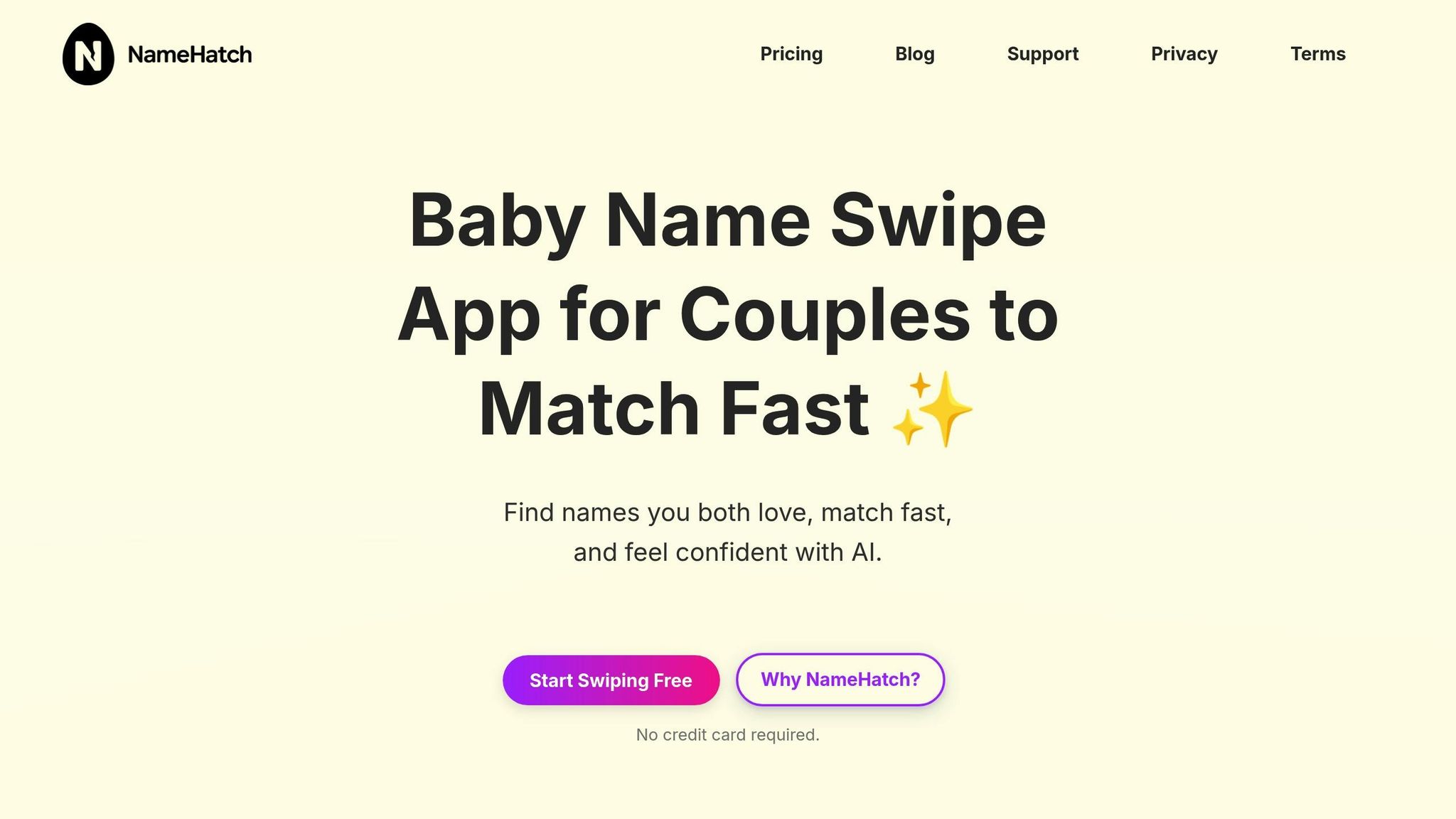Choosing a baby name today is more complex than ever. Parents aim to honor family traditions while embracing modern trends. This balancing act reflects a shift in priorities: from sticking to conventional names to seeking individuality and cultural connection.
- Family Names Matter: Names preserve heritage and connect generations. Cultures like the Akan in Ghana or the Lakota Sioux highlight how names carry deep meanings tied to history and identity.
- Modern Trends: Social media influences baby naming with trends like gender-neutral names, nature-inspired choices, and vintage revivals. Popular 2025 picks include Arwen, Sage, and Ezra.
- Blending Styles: Combining traditional and modern names - like pairing classic middle names with trendy first names - helps parents honor the past while staying current.
- Tools to Help: Apps like NameHatch simplify the naming process with AI suggestions, partner matching, and smart filters for finding the perfect name.
The key is finding a name that feels meaningful yet current, reflecting both family heritage and modern sensibilities.
BABY NAMES: POPULAR OR UNIQUE BABY NAMES? Why Choose A Traditional Name | Ysis Lorenna
Why Family Naming Traditions Matter
Family naming traditions act as unseen threads that tie generations together, offering more than just a way to identify someone. These practices preserve heritage, transmit values, and keep cultural identity alive, creating a bridge between the past and the future.
Cultural and Emotional Meaning of Traditional Names
Traditional names are like living artifacts, each holding a unique historical and cultural significance that goes beyond their sound or spelling. As Eric Selten puts it, "A name is more than a label - it carries the echoes of history, culture, and personal identity". These names often embody long-standing traditions, helping individuals feel connected to their family’s broader story.
The emotional impact of traditional names lies in their ability to tether people to their roots. Names often reflect birth order, celestial events, or traits that parents wish their children to embody. This connection becomes especially poignant for families navigating cultural challenges or displacement, as names can act as a steadfast link to their heritage.
Different cultures highlight this meaning in unique ways. Among the Akan people of Ghana, for example, children are named based on the day of the week they are born. A boy born on Friday is named Kofi, while a girl born on Wednesday is called Akua. These names connect individuals to ancestors who shared the same birth-day identity, reinforcing generational continuity.
In Japan, family names often reveal a family’s geographic or occupational history. Names like Tanaka (田中), meaning "central rice field", reflect the nation’s agricultural roots, while Fujimoto (藤本), meaning "origin of the wisteria plant", serves as a nod to specific historical or environmental ties.
For the Lakota Sioux, traditional names carry profound spiritual significance. These names are often given through ceremonies, reflecting personal traits, spiritual visions, or important life events. Losing these names equates to losing a vital connection to their worldview and cultural identity.
Preserving traditional names is often seen as a form of cultural resilience. As Carol Rice explains, "Family storytelling extends beyond personal narratives, also establishing connections with cultural heritage, traditions, values, and the collective wisdom of ancestors. In today's globalized world, where cultural identities may be overshadowed, family storytelling serves as a means to reclaim and celebrate one's heritage".
Common Family Naming Practices
American naming traditions are a fascinating blend of heritage and diverse influences, reflecting the country’s multicultural fabric. While many families follow the English convention of a first name, a middle name, and a family name, the diversity of American society has allowed for a wide range of variations.
One enduring practice is generational naming, where children are named after grandparents or other relatives. It’s common for middle names to honor close family members, and suffixes like Sr. and Jr. help distinguish individuals within families who share the same name.
In Hispanic and Latino American families, Spanish naming customs are often followed, with children receiving both the father’s and mother’s paternal family names. This practice ensures that maternal heritage remains visible, even after marriage.
Religious naming traditions also play a significant role in many American families. Names of saints or biblical figures are chosen to provide moral guidance and a spiritual connection.
For African American families, naming practices often reflect cultural pride and heritage. Many African Americans select names as a way to affirm identity and solidarity within their community. French-inspired names are particularly popular, while others choose Afrocentric names to honor their roots.
Immigrant communities have long brought their own naming traditions to the United States. British colonists continued practices like naming the first son after the paternal grandfather and the first daughter after the maternal grandmother. Similarly, Italian families often named their firstborn son and daughter after the paternal grandparents. Polish families traditionally named children after saints whose feast days coincided with the child’s birth or baptism.
These diverse naming practices demonstrate how families use names to honor their heritage while adapting to life in a new cultural environment. They reflect the broader American experience of balancing tradition with integration, preserving a sense of identity in an ever-evolving society.
Modern Naming Trends and What Parents Want
These days, parents approach baby naming with a fresh perspective compared to earlier generations. In the past, family traditions or religious customs often dictated name choices. Now, naming has become a way for parents to express their personal values, aspirations, and family stories. This shift mirrors broader societal trends, emphasizing individuality, global awareness, and self-expression. It's within this context that the baby name trends of 2025 are taking shape.
Social media plays a huge role in how parents find inspiration for names. From celebrity picks to trending hashtags, platforms like Instagram and TikTok offer endless ideas. Sophie Kihm from Nameberry puts it perfectly: "The churn of social media trends is ever-quickening, and baby name trends are deftly keeping up". Thanks to this instant access, parents are drawing from a global pool of ideas, sparking new and exciting naming directions.
Popular Baby Name Trends in 2025
The baby naming world in 2025 is buzzing with creativity, as parents experiment with names that balance originality, meaning, and timeless appeal. Here’s a snapshot of the year's standout trends:
- Fast Fashion Names: These are fresh, modern creations that mix current styles with a twist. Think names like Adael, Aella, Emryn, Eydan, and Scottlynn.
- Global Americana: Reflecting the growing diversity in the U.S., this trend embraces names with roots in various cultural traditions, such as Akira, Ewan, Luca, Noemi, and Xochitl.
- Baby Names, Literally: Playful and approachable, these names - like Albie, Dolly, Lottie, Sonny, and Xavi - bring a youthful vibe.
- Country Rebrand: Classic country names get a modern update with choices like Abilene, Clover, Crockett, Loretta, and Waylon.
- Safe Haven Names: These evoke a sense of peace and comfort, with options like Avalon, Bliss, Haven, Meadow, and Shalom.
- Femininomenal Names: Celebrating feminine strength and beauty, this trend includes striking choices like Amaryllis, Cordelia, Juno, Lilith, and Seraphina.
- Landscape Names: Inspired by nature and often gender-neutral, names like Coast, Cove, Creek, Dune, and Ridge are sleek and simple.
- Otherworldly Names: For parents drawn to the mystical, names like Arwen, Cosmo, Ember, Lyra, and Vesper offer a magical touch.
- Croc Names: Once considered old-fashioned, vintage names like Clarence, Ethel, Gilbert, Helen, and Virgil are making a comeback.
- Gen "Z" Names: The letter "Z" is having a moment, with names like Azalea, Ezra, Hazel, Zakai, and Zuri reflecting a bold, modern sound.
These trends highlight how parents are navigating the balance between creativity and timelessness.
Finding the Right Balance Between New and Timeless
Parents today want names that feel modern yet enduring, offering meaning without losing their charm over time. Recent data shows that baby names in 2025 reflect a deep desire to combine personal values with lasting significance.
This balance often involves looking for names with strong roots - ones that feel fresh but are grounded in history. Importantly, "timeless" doesn’t always mean "traditional." Many parents are moving beyond fleeting trends to find names with strength and clarity that resonate on a deeper level.
Cultural authenticity also plays a key role. Parents are blending contemporary styles with family traditions, creating names that honor heritage while embracing modern sensibilities.
Nature-inspired names like Willow, River, and Sage are a perfect example. These choices tap into universal connections to the natural world, making them feel relevant and enduring without relying on pop culture references.
Similarly, gender-neutral names like Quinn, Jordan, and Parker are gaining popularity. They offer flexibility and align with evolving attitudes around gender, making them both practical and meaningful.
Another growing trend is a focus on practicality when it comes to pronunciation and spelling. While unique spellings still attract attention, many parents now prefer names that are easy to spell and pronounce, ensuring they stand out without causing confusion in everyday life. This thoughtful approach reflects the careful consideration modern parents bring to the naming process.
sbb-itb-f13f980
Ways to Blend Old and New in Baby Names
Balancing family heritage with a modern touch is a goal for many parents today. The good news? It’s entirely possible. By thoughtfully combining tradition with contemporary trends, families can create names that feel both meaningful and current. Updating family names doesn’t mean leaving tradition behind - it’s about reimagining and adapting names to reflect today’s sensibilities while keeping their emotional significance intact. Here are some practical ways to merge the old with the new.
Mixing Traditional and Modern Name Styles
One popular method is pairing a traditional family name with a more modern counterpart. For instance, you could choose a trendy first name like Ember or Sage and balance it with a classic middle name such as Elizabeth or James. This approach bridges the past and present, allowing your child to carry forward family history while fitting into today’s naming trends.
Another idea involves drawing inspiration from diverse cultural backgrounds to reflect your family’s heritage. This can be especially meaningful for families with multicultural roots. For example, you might combine elements from both parents’ traditions, blending ancestral names to honor the uniqueness of your family’s story.
Refreshing Family Names for a Modern Touch
If you’d like to preserve a family name but make it feel more contemporary, there are plenty of ways to update it. Parents often tweak names to keep their heritage alive while also expressing individuality. Common approaches include shortening names, blending two names, altering spellings, or even reversing them. Examples include transforming William into Liam, Catherine into Kathryn, or Isabella into Bella.
Collaborating to Find the Perfect Balance
Naming a child can be a deeply personal process, and collaboration between parents is key to finding the right balance. By sharing stories about the significance of traditional names, couples can spark ideas for creative updates. This process can also be an opportunity to explore family histories, cultural backgrounds, and personal preferences together.
Start by making lists of important family names from both sides and brainstorming modern alternatives. Think about practical considerations, too, like how the name sounds with your last name, potential nicknames, and how it might be perceived professionally as your child grows. The goal is to choose a name that honors family traditions while ensuring it will serve your child well throughout their life.
Take inspiration from William Haigen and his wife, who, in January 2024, blended their last names - Egan and Michell - to create Haigen, a unique surname that symbolized their partnership. They also worked together to find first names that honored their roots while complementing their new last name. William shared:
"With our blended name, it doesn't feel like we've let our names go. The pieces of our names are still there; they've just been rearranged and combined with each other's. For us, it feels like the perfect symbol of what we want for our marriage: to merge with another half while still keeping our own identity."
This same approach can guide first name choices as well, helping you craft a name that celebrates family traditions while reflecting your shared hopes for your child’s future.
How NameHatch Makes Naming Easier

NameHatch simplifies the often daunting task of choosing a baby name by blending tradition with modernity through its innovative features. For many couples, balancing family heritage with contemporary trends can feel overwhelming. NameHatch tackles this challenge head-on with an AI-driven platform tailored to help partners collaborate seamlessly on baby name decisions. Instead of endlessly scrolling through massive lists or using clunky tools, couples can rely on NameHatch's intuitive features to find names that reflect both their traditional values and modern preferences.
By pairing advanced technology with an easy-to-use design, NameHatch ensures that both partners feel involved and heard throughout the naming process. It’s a smart way to honor family traditions while embracing today’s styles.
Features That Help Couples Work Together
NameHatch’s swipe-based interface and smart filters make it easy for couples to identify names that bridge classic and modern styles. The app presents names one at a time, allowing each partner to swipe based on their preferences. This method not only speeds up the decision-making process but also ensures couples focus on names that genuinely resonate with them. It’s an engaging way to merge heritage with innovation in baby naming.
The platform’s smart filters are especially handy for couples trying to strike a balance between tradition and modernity. Users can filter names by categories like Classic, Modern, or Nature-Inspired, among others. These filters can even be combined, helping families discover names that feel timeless yet fresh. For those wanting to honor their roots while staying current, this feature is a game-changer.
One standout feature is partner matching, which sends real-time alerts when both partners like the same name. This eliminates guesswork and awkward conversations, instantly highlighting mutual favorites. The app also creates a shared favorites list, making it easy for couples to revisit and discuss their top picks together.
AI Suggestions for Combined Names
NameHatch’s AI-powered suggestions shine when it comes to blending family traditions with modern trends. The AI generates personalized name recommendations based on criteria like first name, last name, gender preferences, and style choices. Whether couples are looking for traditional, modern, or unique options, the AI adapts to their specific needs. By experimenting with various combinations and providing detailed insights, the system supports thoughtful and meaningful decision-making.
Easy Access Across All Devices
With cross-platform compatibility, NameHatch ensures couples can collaborate on naming decisions anytime, anywhere. Whether they’re using a smartphone on the go or a tablet at home, the platform works seamlessly across devices. This flexibility is especially valuable for busy partners juggling hectic schedules.
The app’s clean and simple interface eliminates the frustration often associated with naming tools. There’s no need to navigate complex systems or confusing menus - everything is designed to keep the focus on finding and discussing names, not wrestling with technology.
NameHatch also includes features to save, revisit, and share names effortlessly. Couples can bookmark their favorites, share ideas with each other, and gradually narrow down their options without losing track of potential choices. This organized approach encourages thoughtful decision-making and takes the stress out of the naming process.
Conclusion: Finding the Right Name for Your Family
Picking a name that reflects your heritage while embracing modern influences doesn’t have to feel overwhelming. Names are more than just words - they help define who we are, making this choice both personal and meaningful. Dive into your family history, adapt traditional names, or combine elements of the past and present to create something that truly resonates.
Striking a balance between honoring tradition and embracing individuality starts with open discussions. Talk with your partner about values, family backgrounds, and naming preferences. Practical ideas, like using a grandmother's maiden name as a middle name, exploring variations or nicknames of family names, or digging into your ancestry, can uncover meaningful options while keeping the process creative.
Simplifying the journey is also important. Tools like NameHatch make naming a collaborative and stress-free experience with features like swipe-based discovery, smart filters, AI-powered suggestions, and partner matching. These modern solutions can help you find a name that feels just right.
FAQs
How can parents choose a unique baby name while honoring family traditions?
Balancing a distinctive name with family traditions can be a thoughtful way to honor your roots while embracing individuality. One idea is to use a family name as the middle name, giving the first name the freedom to stand out while still keeping a nod to heritage. Alternatively, you could update a traditional name by tweaking its spelling, blending it with another name, or opting for a modern nickname that feels fresh.
For a more tailored solution, tools like AI-powered platforms can help you find names that merge tradition with originality. These tools can make the process easier and ensure the name holds a special meaning for both you and your family, creating a bridge between the past and the present.
What are some creative ways to honor family traditions while choosing a modern baby name?
Blending family traditions with modern baby names can be a thoughtful way to honor your heritage while embracing contemporary trends. One idea is to combine elements of traditional names with newer ones. For instance, you could mix syllables from two family names or give a classic name a modern update by tweaking its spelling or pronunciation.
Another approach is to consider double-barrel or hyphenated names. These can pay tribute to multiple family members while maintaining a fresh and current feel. If you're looking for a subtler nod to tradition, middle names offer a great way to preserve family history while keeping the first name more modern and distinctive.
The key is finding a combination that resonates with your family. Tools like NameHatch can make the process easier by providing tailored suggestions and helping you collaborate with your partner to create the perfect name.
How can NameHatch help parents choose a baby name that blends family traditions with modern trends?
NameHatch’s AI-driven platform simplifies the process of finding names that balance family or heritage traditions with a modern flair. By taking into account your preferences, family customs, and personal style, it delivers tailored name suggestions that align with what matters most to you.
The platform also includes tools like smart filters and partner matching, making it easy for both parents to work together and choose a name that’s meaningful, enduring, and contemporary.



